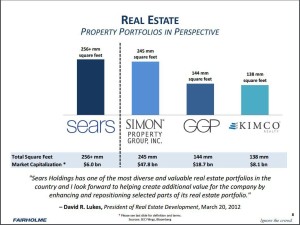Summary
Sears Auto Centers aren’t being sold to a 3rd party.
Seritage has the right to recapture 100% of the Sears Auto Centers.
The Sears Auto Center real estate doesn’t appear to be moving.
We decided to write an article on Sears Auto Centers because we believe it exemplifies one of the major flaws in the long thesis on Sears (NASDAQ:SHLD). Sears Auto Center represents a tiny portion of Sears’ overall revenue, but the flaw we will discuss permeates a large portion of the investment valuation for Sears. It also demonstrates when reasoning can go bad.
What is the flaw? We believe that many investors have artificially inflated the value of Sears by valuing the real estate of Sears independent of the underlying retail business. Because Sears continues to lose money the net asset valuation calculations used by investors fail to account for these ongoing losses, and thus their calculations might be artificially high. Also, some have suggested that combined with the real estate, that the businesses owned by Sears have hidden values in of themselves that can be monetized outside of Sears (for example, KCD brands). Hence, they get the value of the real estate plus the value assigned to the different operating businesses. We believe that this represents a form of double dipping. Either you value the operating businesses or you value the real estate with no operating businesses. And the experience with Sears Auto Centers offers one example of why this might be important.
The Market Cap Myth
First we wanted to take a brief moment to address one issue. We hope that this helps educate the average investor on how to think about property valuations, as it offers a cautionary tale. Also, we think it demonstrates how investors need to be skeptical in their reliance on other people’s work (including ours). In the Fairholme presentation on Sears, Fairholme offered the attached slide.
View entire article at Seeking Alpha.com
To discuss commercial mortgage financing needs contact Liberty Realty Capital.





